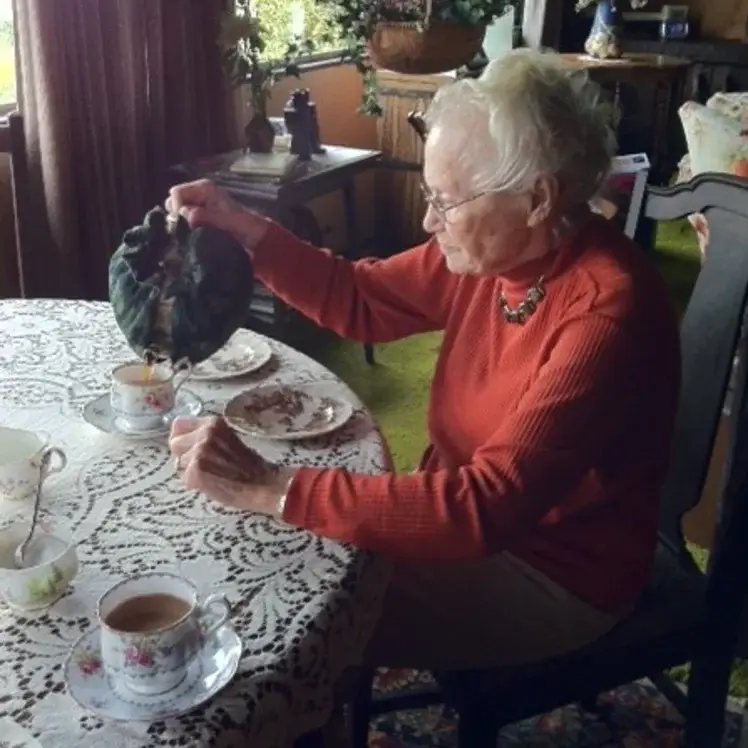What Does Humility Look Like?

It looks like Jesus. He humbled Himself, left heaven’s glory, and assumed human form for our sake. He gave up His rights and became a servant to benefit us.
What does humility look like? To me, it looks like an elderly woman who attended my church years ago. My family fondly dubbed her “Granny Maude.”
Granny Maude’s short, stooped frame made it difficult for her to see over the steering wheel of her car but that didn’t stop her from driving all over town. Wherever someone needed help, she showed up with a smile and a willing heart.
Some folks thrive on public recognition for doing what they do, but Granny Maude never fell into that category. She blessed others with no expectation of favors being returned and no desire for accolades. She loved and served freely because she understood Jesus’ love for her and wanted to share it.
Granny Maude’s eager willingness to serve others spoke volumes to me when I was a young mom in my late 20s, and her example remains embedded in my memory four decades later. She showed me what humility looks like, and I’m grateful for the lessons she taught me without words. I’m also grateful for God’s Word that teaches other lessons about what humility looks like.
What Does Humility Look Like?
Strength of Character
Pride wants to rush into self-defense mode when someone hurts us. Humility refuses to go there. Instead, it prompts us to pray for that person, to ask God to help us see her through His eyes, and to trust Him to be our defender.
Humility demonstrates strength of character, like the strength Jesus showed as He hung on the cross. He could have hurled insults at those who hurt Him, but He did not. Instead, He asked God to forgive them. (Luke 23:34)
How do we respond when someone hurts us? Do we rush to defend ourselves or hurl the insults back? Humility refrains from doing so. Instead, it chooses the high road. It trusts God to defend us and to deal with the offender in His way and time.
Teachability
Pride says our way of thinking or doing things is the best. Humility admits that another’s way might be as good or better. It accepts correction and direction. (Proverbs 15:32)
I’m saddened when new writers show me their works-in-progress and insist they ought to be published as is. I can relate to their passion; I felt the same about my writing at the start of my career, but I had to undergo an attitude revision.
In 1999, at my first writers conference, an editor used her red pen to butcher the first two devotionals I’d ever written. I watched and muffled horrified gasps. Then she asked to critique a third. Moments after she began reading it, she shook her head and said, “Grace – this is awful. I want you to go home, read the comments I made on the others, and rewrite using my suggestions.” I swallowed my pride and heeded her advice.
Humility admits that we don’t know everything. We can learn from others’ experience and expertise.
Willingness to Get Our Hands Dirty
Pride tells us we’re above doing certain tasks. It says we’re justified in leaving the dirty work to those less qualified or important than ourselves.
Humility jumps in to get the dirty work done like Jesus did when He knelt and washed His disciples’ feet. Under normal circumstances, the lowliest household servant performed this task, but Jesus did it without hesitation because He had nothing to prove and no need to impress. (John 13:1-17)
Humility sees a need and steps in to meet that need with no worries about losing status, respect, or authority in others’ eyes. Getting one’s hands dirty, literally or metaphorically speaking, is not an issue.
What does humility look like? Ultimately, it looks like Jesus. He humbled Himself, left heaven’s glory, and assumed human form for our sake. He gave up His rights and became a servant to benefit us.
What might humility look like in our everyday lives? Much the same as Jesus. Or Granny Maude, for that matter. It’s demonstrating strength of character when others hurt us. It’s being teachable and admitting that we don’t know it all. It’s being willing to get our hands dirty. But it’s also showing up with a smile and a willing heart to benefit others with no thought of the favor being returned or receiving public accolades.
So tell me, my friend
Which one of these descriptions resonates most with you today, and why?
Know you are loved,
Grace







